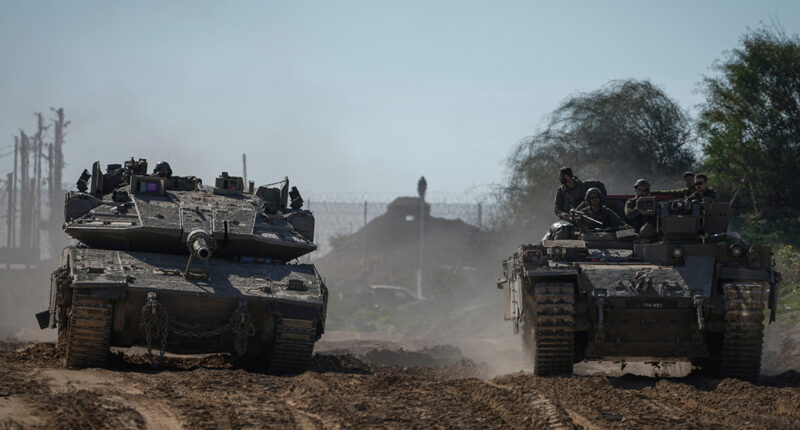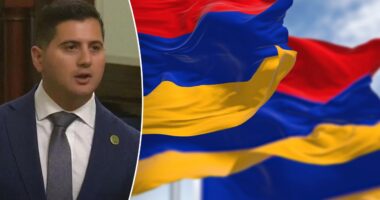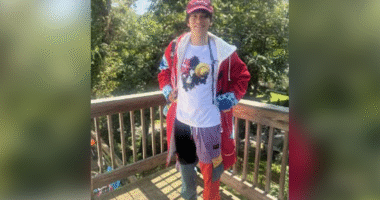CAIRO — The ceasefire between Hamas and Israel will go into effect in less than 24 hours, said Qatar’s foreign ministry on Saturday.
According to Qatar’s foreign minister Majid al-Ansari, the ceasefire is scheduled to commence at 8:30 a.m. (0630 GMT) on Sunday. Al-Ansari advised the public to be cautious when the agreement takes effect and to await instructions from authorities.
In a decision made early Saturday, Israel’s Cabinet gave the green light to a ceasefire agreement in Gaza that would lead to the release of numerous hostages and a temporary halt to the 15-month long conflict with Hamas. This move signifies a significant step towards ending the most lethal and damaging hostilities between the two parties.
In spite of the ceasefire announcement, alarms were sounded throughout central Israel on Saturday as the military reported thwarting projectiles launched from Yemen. The Houthis, supported by Iran, have escalated their missile assaults in recent weeks, claiming that these actions are part of their strategy to put pressure on Israel and Western nations regarding the conflict in Gaza.
There were also continued Israeli strikes into Gaza. The Palestinian Health Ministry said at least 23 people were killed in the previous day.
Under the first phase of the ceasefire, 33 hostages are set to be released over the next six weeks, in exchange for hundreds of Palestinians imprisoned by Israel. The remainder, including male soldiers, are to be released in a second phase that will be negotiated during the first. Hamas has said it will not release the remaining captives without a lasting ceasefire and a full Israeli withdrawal.
SEE MORE: What’s in the ceasefire deal between Israel and Hamas
According to the ceasefire plan, approved by the Cabinet and signed by Israel’s national security adviser, the exchange will begin Sunday at 4 p.m. (1400 GMT). During each exchange, prisoners will be released by Israel after the hostages have arrived safely.
The plan says that during phase one, some 1,900 Palestinian prisoners will be released, in exchange for 33 Israeli hostages, both alive and dead. Among the prisoners, 1,167 are residents in Gaza who were held by Israel but were not involved in Oct. 7. All women and children under 19 from Gaza held by Israel will be freed during this phase.
All Palestinian prisoners who were convicted of deadly attacks will be exiled, either to Gaza or abroad, and barred from returning to Israel or the West Bank. Some will be exiled for three years and others permanently, according to the plan.
Key questions remain about the ceasefire, however – the second achieved during the war – including the names of the 33 hostages who are to be released and who among them is still alive.
Hamas has agreed to free three female hostages on Day 1 of the deal, four on Day 7 and the remaining 26 over the following five weeks.
Palestinian detainees are to be released as well. Israel’s justice ministry published a list of more than 700 who are to be freed in the deal’s first phase and said the release will not begin before 4 p.m. local time Sunday. All people on the list are younger or female.
Also during the first phase, Israeli troops are to pull back into a buffer zone about a kilometer (0.6 miles) wide inside Gaza, along its borders with Israel.
That will allow displaced Palestinians to return to their homes, including in Gaza City and northern Gaza. With most of Gaza’s population driven into massive, squalid tent camps, Palestinians are desperate to get back to their homes, even though many were destroyed or heavily damaged by Israel’s campaign.
The largely devastated territory should also see a surge in humanitarian aid. Trucks carrying aid lined up Friday on the Egyptian side of the Rafah border crossing into Gaza. On Saturday, two Egyptian government ministers arrived in the northern Sinai Peninsula to oversee the preparations for the delivery of aid and to receive the evacuation of wounded patients, the health ministry said.
Hamas triggered the war with its Oct. 7, 2023, cross-border attack into Israel that killed some 1,200 people and left some 250 others captive. Nearly 100 hostages remain in Gaza.
Israel responded with a devastating offensive that has killed more than 46,000 Palestinians, according to local health officials, who do not distinguish between civilians and militants but say women and children make up more than half the dead.
—
Mednick reported from Jerusalem. Associated Press reporter Joe Federman in Jerusalem contributed.
Copyright © 2025 by The Associated Press. All Rights Reserved.

















